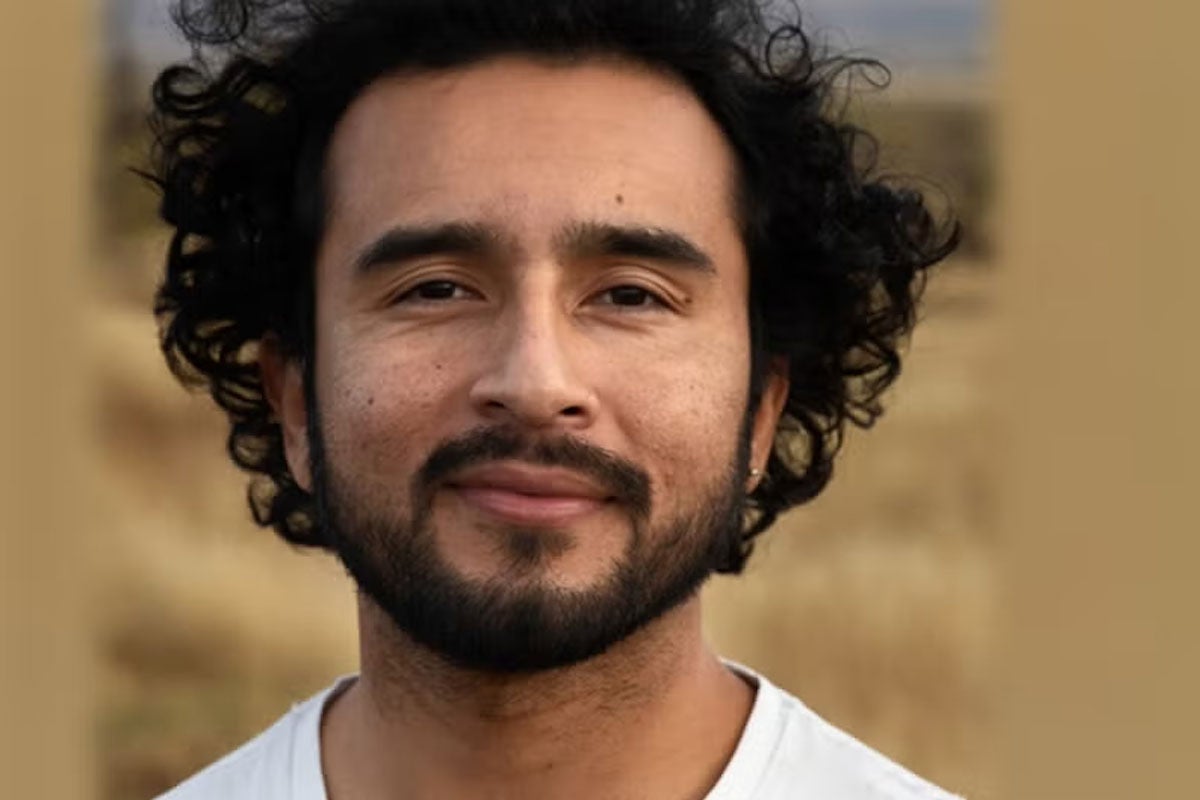KINGSTON, RI – Oct. 17, 2024 – URI’s Center for Humanities and Hispanic Heritage Month Committee hosted memoirist, poet, and speaker, Javier Zamora, in a discussion about the ideas of democracy through the lens of an immigrant. Along with students and faculty, the URI Higgins Welcome Center had students from St. Andrews boarding and day school in attendance. Professor Marta Elena Rojas of The English Department moderated the conversation with Zamora, which was followed by a question and answer session.
Born in San Luis La Herradura, El Salvador, Zamora grew up with a strong sense of community. The violence that took over the country caused his parents to flee, leaving 2 year old Zamora in El Salvador with his grandparents. The poet crossed parts of El Salvador, Guatemala, Mexico, and the Arizona desert to migrate to the U.S. at the age of nine years, reuniting with his parents in California.
Growing up as an immigrant in the states left Zamora under temporary protected status. (This status prevents immigrants from applying for career opportunities.) Still, the writer continued to work persistently.
Zamora earned a BA at the University of California Berkeley and an MFA from NYU. Additionally, Zamora earned a Sterner fellow position at Stanford University and a Radcliff fellow position at Harvard. In 2015, Zamora co-founded Undocupoets with Marcelo Hernandez Castillo and Christopher Soto. The activist group fights to end citizenship based discrimination in poetry publishing and contests. His memoir, Solito, has been selected by the Rhode Island Center for the Book as a Reading Across Rhode Island text.
“From my perspective, there used to be a huge vacuum from 1999 to 2006,” Zamora said. “We went from not being talked about, to being everywhere. There was this idea that only law-abiding immigrants are deserving of papers or documents.”
Zamora immigrated in 2006. It was during this time that one of the biggest protests since the civil rights movements took place. The Great American Boycott, or the Day without an Immigrant, took place on May 1st, seeing U.S. schools and businesses boycotted by immigrants. Protesters wore white as a symbol for peace and unity.
“As an undocumented immigrant, seeing people that have been told have no power to be out boldly all wearing white meant everything to me,” Zamora said.
75% of El Salvador’s population did not know how to read or write before the civil war, sparking a revolution. Salvadorians fought for access to schools and gender equality in Central America. In 2024, El Salvador has one of the highest democide rates in the world. The United States’ involvement in the revolution caused the left to lose, as they began giving the right-wing government $3 million a day. In 1980, there were less than 60,000 Salvadorians in the United States. By the late 1990s, this number grew to 1 million.
Zamora reflects on the influence of anger throughout his life and how different outlets for this anger allowed for different perspectives. The different uses of anger between Zamora’s first book, Unaccompanied, and his memoir Solito reflect the different stages of his healing journey.
“For Unaccompanied, I just needed to get the anger out,” Zamora said. “It seems like a very angry book, but anger is not the primary emotion. That anger comes from sadness.”
The anger in Solito is more subtle, unlike Unaccompanied. The memoir originally started following 29 year old Zamora’s acceptance to Harvard. However, along the way Zamora felt that people would not listen to what he had to say through this perspective. Instead, he shifted the narrative to his 9 year old self. This approach not only differentiates the memoir from others, but also aids the author in his healing journey.
“My second book, with therapy, with a green card, with now a paycheck from Harvard, I wanted to complicate that anger,” Zamora said. “Because, when you approach somebody with only anger, they’re only going to focus on how angry you are. If I have done a good job, you will also have empathy for the adults around me because that child wouldn’t have survived without the adults around.”
In the book, Zamora delves into processing his trauma through therapy. As a means to cope, he believed his experiences to be exclusive and became the sole carrier of this heavy trauma. This left him vulnerable and unsafe to disclose his immigrant status with his peers. Along with therapy, Zamora returned to the border once he received his green card to retrace his steps, in order to be reminded of the details of his journey.
“We are not our trauma,” Zamora said. “You are not your immigration status. Grow by acknowledging your roots.”
Zamora strongly believes that it is his job as a writer and as an artist to not only point out when something is wrong, but to offer a solution. He encourages his audience to adopt this mindset and dream for a world that we need, not one that we do not have.
“I don’t have the answers, but the closest thing I have come to really understanding what that could look like would be to look at who was here before. Once we get to the root causes and once we learn that there is a deeper knowledge on the lands that we stand on, then perhaps we’re going to get the answers that we need in order to change and save our planet.”
This event review was written by Erin Malinn, class of 2028.

